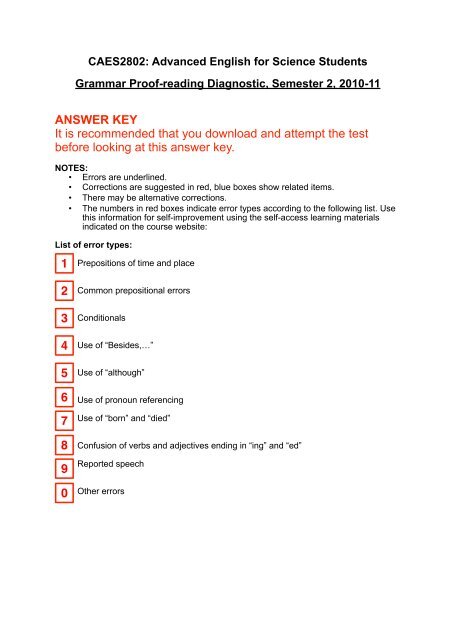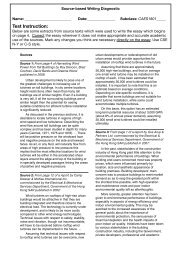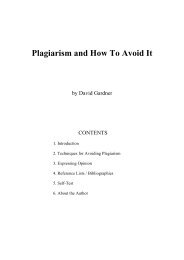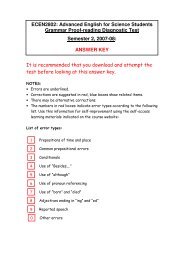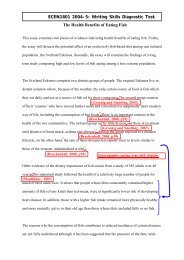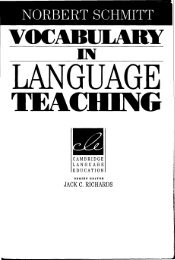Grammar Diagnostic Answer Key-2011 - CAES
Grammar Diagnostic Answer Key-2011 - CAES
Grammar Diagnostic Answer Key-2011 - CAES
You also want an ePaper? Increase the reach of your titles
YUMPU automatically turns print PDFs into web optimized ePapers that Google loves.
<strong>CAES</strong>2802: Advanced English for Science Students<br />
<strong>Grammar</strong> Proof-reading <strong>Diagnostic</strong>, Semester 2, 2010-11<br />
ANSWER KEY<br />
It is recommended that you download and attempt the test<br />
before looking at this answer key.<br />
NOTES:<br />
• Errors are underlined.<br />
• Corrections are suggested in red, blue boxes show related items.<br />
• There may be alternative corrections.<br />
• The numbers in red boxes indicate error types according to the following list. Use<br />
this information for self-improvement using the self-access learning materials<br />
indicated on the course website:<br />
List of error types:<br />
1<br />
Prepositions of time and place<br />
2<br />
3<br />
4<br />
5<br />
6<br />
7<br />
8<br />
9<br />
0<br />
Common prepositional errors<br />
Conditionals<br />
Use of “Besides,…”<br />
Use of “although”<br />
Use of pronoun referencing<br />
Use of “born” and “died”<br />
Confusion of verbs and adjectives ending in “ing” and “ed”<br />
Reported speech<br />
Other errors
Improving The Selection Procedure For University Entrance<br />
7<br />
born<br />
Citizens of Hong Kong, both those borned here and those who grow up here after emigrating from<br />
to<br />
elsewhere, should be proud of the quality of the tertiary education system available by them. Access<br />
to<br />
they were born<br />
of that system is available to everyone regardless of where he was borned and regardless of their<br />
2 6 7<br />
4<br />
DELETE<br />
family’s income. Besides, access is based on ability alone. However, the university entrance system<br />
2<br />
in Hong Kong which decides who should be admitted to university education needs some<br />
5 DELETE Or REPLACE BY JOINING SENTENCES WITH ;<br />
students 0<br />
improvement. Although an improved system would benefit Hong Kong society because the student<br />
gaining entrance to universities today will become the leaders of tomorrow. This article will identify<br />
several problems with that entrance system and suggest possible improvements.<br />
1<br />
The Problem of Public Examinations<br />
in<br />
The main method used at Hong Kong to select university students is public examinations which are<br />
0<br />
used to fill over 75% of all Hong Kong tertiary education places 1,2 . Exams are an important way of<br />
candidate’s<br />
determining the extent of a candidates knowledge. Unfortunately, there is a tendency with most<br />
2 3<br />
to<br />
DELETE<br />
exams to test ability to memorise information rather than ability in understand information. If<br />
in<br />
examinations can be created which shift the emphasis to the latter but most public examinations on<br />
students’<br />
Hong Kong focus on the former and are largely unable to assess student’s level of understanding 3 .<br />
1<br />
0<br />
was<br />
A 2006 report in the Hong Kong Economic Times suggested that a result of the exam system is to<br />
could<br />
identify students who can be described as “high marks, low abilities” 4 . The current system of public<br />
on<br />
examinations also puts a huge amount of pressure for students to conform to the requirements of the<br />
9<br />
9<br />
2<br />
exams at the expense of developing more analytical thinking skills. This, in turn, will diminish<br />
1
0<br />
learning<br />
independent learnings and free thinking, both of which have been identified by the Hong Kong<br />
Government and universities as essential skills for the future development and well-being of Hong<br />
Kong.<br />
0<br />
0<br />
6<br />
Alternative Systems<br />
problems<br />
There are two main problem with the current exam-based system of selecting students for university<br />
emphasises<br />
entrance. Firstly, the system over-emphasise candidates’ ability to memorise and regurgitate<br />
it focuses<br />
information within a limited period. Secondly, they focus on academic excellence to the exclusion of<br />
2<br />
other important attributes of potential candidates. The remainder of this article will present alternatives<br />
in<br />
to redress these faults on the current system.<br />
Moving the Balance away from Memorisation<br />
3<br />
A good method of minimising the importance of memorisation is to include continuous assessments<br />
will demonstrate<br />
such as project work and progress checks 3 . If they are used, students demonstrate their best work<br />
based on planning, reflection and continued effort rather than memorisation and speed. Students<br />
interested bored<br />
DELETE<br />
would be more interesting and less boring using this form of study. Besides, some continuous<br />
8 8 4<br />
assessment tasks have already been introduced into the government examination system. For<br />
example, in some subjects part of the assessment is based on laboratory experiments and reports,<br />
although these assessments usually account for only 10% to 20% of the overall subject assessment 5 .<br />
5 Although<br />
were / is<br />
As a step in the right direction, these measures are not enough. If the weighting is increased and such<br />
were / are<br />
would / will be<br />
assessments are introduced into more subjects, the result would be to decrease the dominant effect<br />
of final examinations, re-balance the emphasis from memorisation to understanding and provide a<br />
more accurate assessment of students’ overall abilities 3 .<br />
a) “were”, “were” + “would”<br />
OR<br />
b) “is”, “are” + “will be”<br />
3<br />
2
To move away from a total focus on examinations it would be necessary to initiate changes in<br />
teaching. Quite understandably, there is an emphasis on preparing students for examinations and thus<br />
DELETE<br />
a focus on memorisation and test-taking skills. Besides, with a bigger emphasis on continuous<br />
4<br />
assessment and attempts to assess students’ abilities to think, schools would need to introduce<br />
problem-based learning and liberal studies in which students explore problems/issues and find their<br />
own solutions 6, 7 .<br />
Adding to the Focus on Academic Excellence<br />
on<br />
A university entrance system which relies solely to public examinations is giving importance only to<br />
it is<br />
academic excellence. There is no doubt that they are an important goal of universities but they also<br />
2<br />
6<br />
0<br />
emphasise the importance of all round education, community service and excellence in other areas.<br />
universities<br />
their<br />
Therefore, it makes sense for university to place a higher emphasis on those aspects of its potential<br />
6<br />
students.<br />
In addition to the academic excellence assessed through examinations, universities should be looking<br />
DELETE COMMA. (DELETING THE WORD IS NOT ACCEPTABLE)<br />
at outstanding athletes. Besides, developing the study of sports theories or physical anthropology,<br />
4<br />
the intake of athletes would encourage the development of numerous sports teams which would<br />
this<br />
benefit all students. An example of it is already taking place at the Chinese University of Hong Kong<br />
6<br />
which reserves about 10 places in each cohort for outstanding athletes who are already members of<br />
sports teams representing Hong Kong or have performed exceptionally in inter-school competitions 8 .<br />
they meet<br />
Such students are accepted on condition that he meets the basic admission requirements of the<br />
6<br />
university.<br />
3
There are also cases of students who are extremely talented but perform poorly in public<br />
is<br />
examinations. If their talent was clear from their inventions, designs or discoveries, or from awards<br />
3<br />
they have received for their achievements, such students should be admitted to universities regardless<br />
they<br />
of their public examination outcomes because they have talents that need nurturing and because she<br />
for<br />
can be developed into important assets to Hong Kong.<br />
6<br />
2<br />
0<br />
Conclusion<br />
although<br />
Hong Kong has clearly developed a world-class tertiary education system and for the system to be of<br />
need<br />
they<br />
most benefit, universities needs to review the way it selects students. This article does not suggest<br />
5<br />
6<br />
abandoning the system but augmenting it by reducing the emphasis on memorisation and the ability<br />
to quickly repeat information in a standardised format (an essay) as well as spreading the focus to<br />
incorporate other abilities besides academic excellence which has, for so long, been the main<br />
were made they would OR are made they will<br />
criterion used. If such changes were made they will enhance the quality of today’s students and<br />
exciting<br />
make universities more excited places in which to study.<br />
3<br />
8<br />
References:<br />
1. Joint University Programmes Admissions System. Facts and figures [online]. 2006. Available: http://<br />
www.hku.hk/jupas/content_stat_application.htm. Accessed: 2007 March 16.<br />
2. University Grants Committee. Statistics [online]. 2006. Available: http://www.ugc.edu.hk/eng/doc/<br />
ugc/stat/enrolfte.pdf. Accessed: 2007 March 16.<br />
3. [Anonymous]. Review of public examination system in Hong Kong. Hong Kong: Hong Kong Baptist<br />
University, Hong Kong Examinations Authority; 1998. 250p.<br />
4. [Anonymous]. 2006 3rd May. The trend of having tutorial lessons [online]. Hong Kong Economic<br />
Times. Available: http://libwisesearch.wisers.com.eproxy2.lib.hku.hk/wisesearch/index.do_.<br />
Accessed: 2007 March 16. In Chinese.<br />
5. Hong Kong Examinations and Assessment Authority [online]. Available: http://eant01.hkeaa.edu.hk/<br />
hkea/new_look_home.asp. 2007. Accessed: 2007 March 16.<br />
6. University of Delaware. Problem based learning [online]. 2006. Available: http://www.udel.edu/pbl/.<br />
Accessed: 2007 March 16.<br />
7. Education and Manpower and Bureau. Frequently asked questions on reforming the academic<br />
structure of senior secondary education and university education [online]. 2005. Available: http://<br />
www.emb.gov.hk/index.aspxnodeid=4003&langno=1. Accessed: 2007 March 16.<br />
8. The Chinese University of Hong Kong. Press release [online]. 2001. Available: http://<br />
www.cuhk.edu.hk/ipro/011029.htm. Accessed: 2007 March 16. In Chinese.<br />
NO PROOF-READING REQUIRED<br />
IN THIS SECTION<br />
-------- END OF PAPER --------<br />
4


